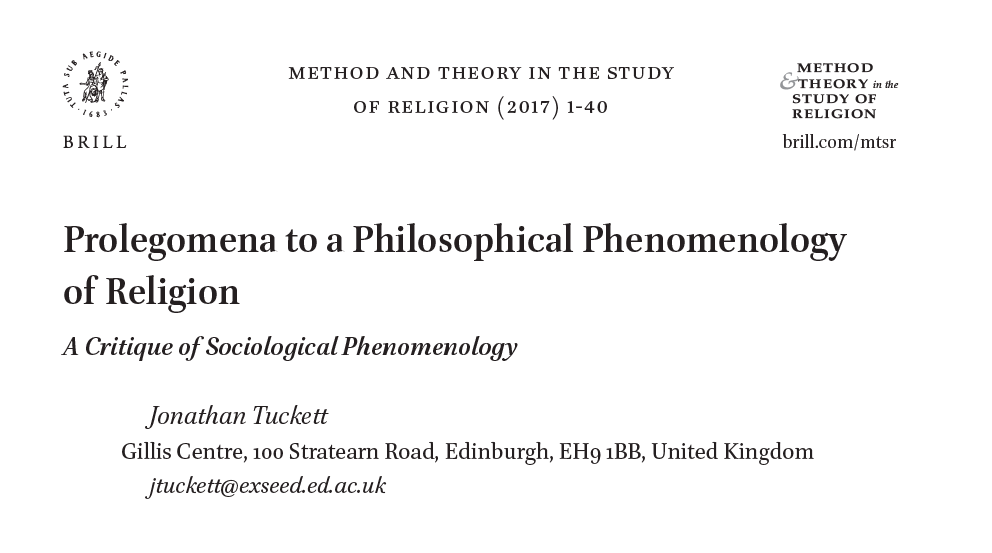The following post from Emma Gibson, a student in our MA program, reflects on the recent meeting of the journal reading group, part of our Religion in Culture MA.
So, what exactly is phenomenology? When I started my first semester in fall 2017 at the religious studies department, I got some interesting looks when I told everyone I was primarily interested in phenomenology. I learned quickly that phenomenology of religion and philosophical phenomenology are not the same thing. Perhaps this is because I spent most of my undergraduate degree as a philosophy major. For example, I was surprised to learn that most phenomenologists of religion have framed their work as a study of “religious experience” in order to either argue for an unknowable God, or to claim that these experiences are unique from other kinds of experience. Philosophical phenomenology focuses on the general experience of the subject making sense of the world, rather than separately analyzing “kinds” of experiences.
I am currently developing a topic for my M.A. thesis that compares and contrasts both philosophical phenomenology and phenomenology of religion. Jonathan Tuckett’s article “Prolegomena to a Philosophical Phenomenology,” proposes one way of doing phenomenology of religion that is better aligned with philosophical phenomenological methods. So I suggested it for our journal group. Tuckett argues that phenomenology of religion should return to and follow more closely the methods developed by Edmund Husserl. More specifically, Husserl’s philosophy on intersubjectivity and ‘life-worlds’. Tuckett argues that Alfred Schutz (a follower of Husserl) influenced scholars such as James Spickard and Peter Berger who both attempted to outline a philosophical phenomenology in line with Husserl’s philosophy. According to Tuckett, they fall short because they did not consider Husserl’s later phenomenology (2). Tuckett’s final point is that a revised sociological phenomenology is best suited to achieve the goals of Spickard and Berger. It is “an enquiry into the structures of knowledge which produce reality” (6). For the purposes of my MA thesis, articles like Tuckett’s will help me explain why and how the phenomenology of religion is so different from philosophical phenomenology.
While I was reading the article, I was drawn to Tuckett’s proposal to conceptualize religion as “alien”. Tuckett explores how the work of Husserl deployed a distinction between the home-world and the alien-world (8). The home world is a “homogenous totality” (33) while the alien, “entails the introduction of heterogeneity by destabilising the homogeneity of the home-world” (33). The last section, “A Proper Phenomenology of Religion,” is the introduction to a more extensive project, where he proposes “secular” as an analytical umbrella that designates the set of that which is naturalized. “Religion,” then, marks what does not fit into that set.
It reminded me of the work being done in my Women’s Studies feminist theory and the abject taught by Dr. Jennifer Purvis. I recently read and wrote on Judith Butler’s philosophy. Butler argues that the abject is what is cast away from society for the modern subject’s identity formation. The individual cannot make sense of who they are without defining what they are not. In Bodies That Matter, Butler says, “the subject is constituted through the force of exclusion and abjection” (xiii). The key take away from Butler’s philosophy in the context of this blog post is the relationship between the subject and the other. There is no essential subjecthood, but, rather, a subject constituted by categories, dualisms, language, and negation.
While I recognize that Butler’s abject refers to that which is undesirable and Tuckett’s alien is geared more towards that which is unfamiliar, both act in a way that may help subjects critically reflect on their assumed norms and language. Also, in many ways the concept of the abject functions similarly to Tuckett’s alien. The abject disrupts our thinking but does not necessarily have to be inaccessible. To bring the two in relation to each other, Tuckett says, “The very point of this alien encounter, then, is that in presenting the person with both inaccessibility and non-belonging they are made to realise that they are not the master of themselves” (34). This quote led me to draw similarities between the abject and the alien because both highlight how subjects produce themselves in such a way as to reveal what they are not.
So, a phenomenology of religion influenced by philosophical phenomenology in line with Husserl takes into account the problems of intersubjectivity. Drawing distinctions between religious experience and secular experience presupposes that these distinctions are natural, but, they are actually claims made in the home-world–claims that are taken for granted. A sociological phenomenology brings these distinctions between phenomenology of religion and philosophical phenomenology to light and could definitely be helpful in considering fundamental difference between the two methods.
